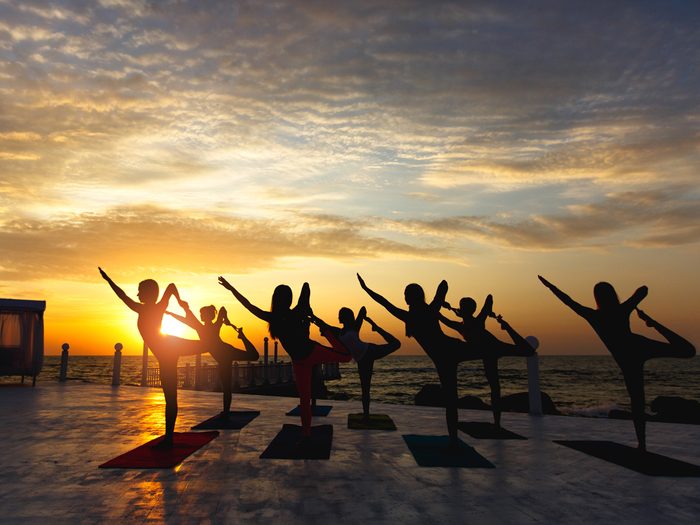
The word “yoga” is sanskrit and has many translations, including “union.”
The practice originated as a philosophy to unite mind, body and spirit through breath control, meditation and physical postures. Today, mounting evidence suggests that yoga does, in fact, have major age-defying benefits — and one key to reaping them is that the younger you start yoga, the better. “While you can take up yoga at any age and see a benefit, the earlier you start — and the more consistently you practise it over the years — the greater the effects,” says Dr. Timothy McCall, a doctor of internal medicine in the San Francisco Bay Area and the author of Yoga As Medicine.
One of the major anti-aging benefits of yoga is how it helps you learn to manage stress, a risk factor in age-related illnesses ranging from heart disease to depression. But don’t expect one or two classes to magically make you cool and composed — it takes time to change the way you react to stress. “We know that the way the brain can change itself is through repetition of any activity, thought, word or deed over a long period of time,” says McCall. “So even a short yoga session every day has far more benefit than a longer practice once a week.”
Here are some more ways yoga can help you live a healthy, happy life now, and well into your old age, plus some simple postures to practise every day.
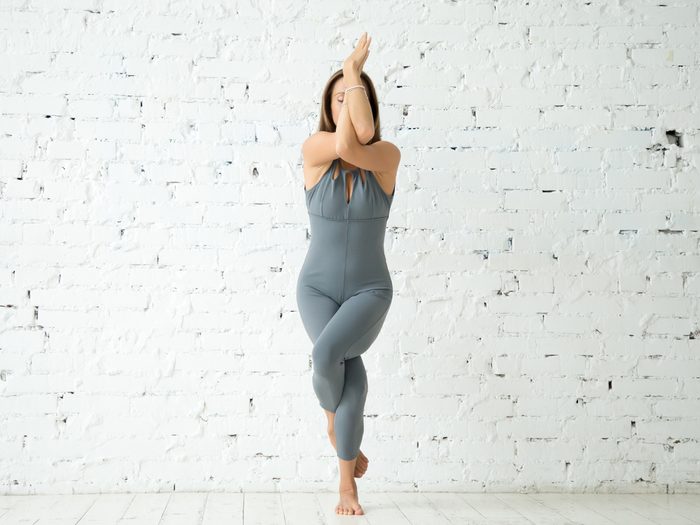
Yoga can help with flexibility & joint health
A 2011 study published in the Archives of Gerontology and Geriatrics suggests that older women who practise yoga may experience improved range of motion when performing everyday tasks. That means these women can maintain their independence longer, since flexibility makes it easier to do routine things such as cleaning, bathing and cooking.
Taking up yoga may also help to prevent and relieve symptoms of arthritis, which the Arthritis Society pinpoints as the main cause of disability among Canadians. The most common form is osteoarthritis, a result of the deterioration of the cartilage that protects joints. While age is a big risk factor, yoga may help reduce symptoms. “The things that seem to prevent [osteoarthritis] are keeping your weight down, having good muscle tone and being flexible,” says Dr. John Esdaile, scientific research director of the Arthritis Research Centre of Canada, based in Vancouver. “Yoga is good for muscles and flexibility.”
Vancouver-based yoga instructor Kim Scarrow, 28, was diagnosed with a form of arthritis at just 19 years of age, and says the postures and breathing techniques help her cope. “People become depressed because of chronic pain, but yoga helps me through the psychological effects that chronic pain creates.” And if you’re looking for a new fitness challenge? Try our one-week stretching program.
Pose to try: Eagle
It creates strength in the muscles to support the joints, and helps with flexibility.
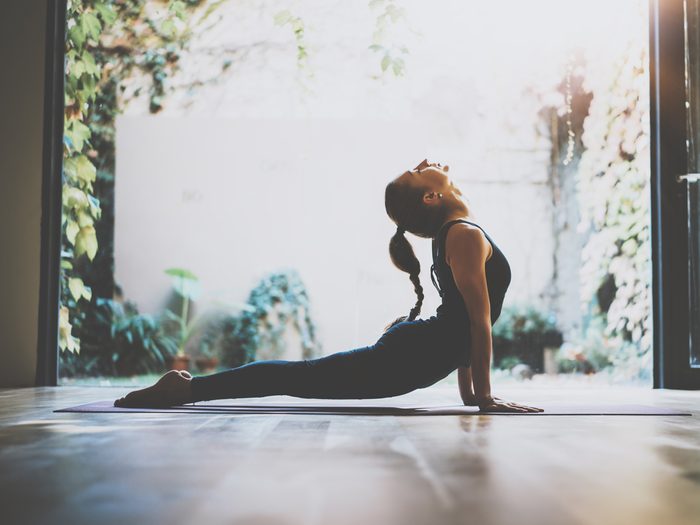
Yoga can help soothe back pain
About 80 percent of Canadians will suffer back pain at some point in their lives, according to The Canadian Spine Society, and it can be debilitating. But as you age, backaches may become even more dangerous. “Evidence suggests that chronic back pain is linked to a higher risk of falling in the elderly,” says Dr. Maziar Badii, a spine rheumatologist based in Vancouver.
Performing yoga postures can help lower your risk of back problems by strengthening core muscles, “which research shows will lessen back pain or make it go away,” says Dr. Esdaile. Strong core muscles support the back and alleviate strain on the muscles and spine.
Participating in a yoga class may even be more effective for relieving back pain than doing some other forms of stretching, according to 2011 research published in the Archives of Internal Medicine. The study—probably the largest-ever yoga trial conducted in the U.S.—revealed that people who participated in yoga classes reported better back function and less back pain than those who did stretching exercises using instructions from a self-help book.
Pose to try: Cobra
This back bend strengthens muscles and creates flexibility in the spine. But start gently and work your way up in terms of how far you bend.
Is your back pain too much to handle? Make sure you see an acupuncturist.
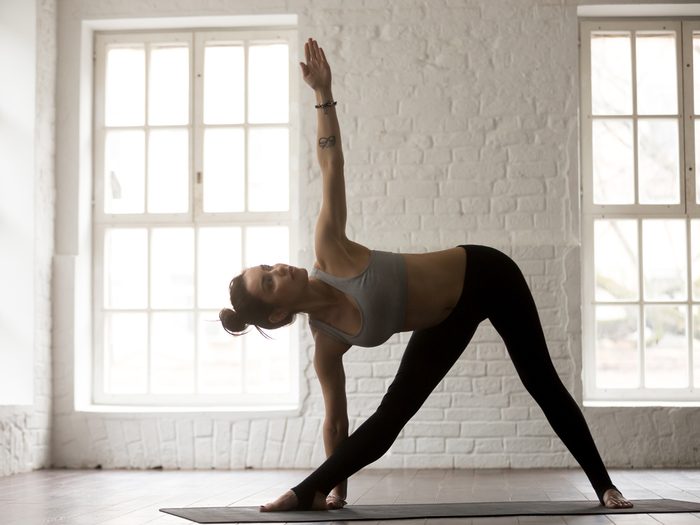
Yoga can help boost heart health
Cardiovascular disease is the number one killer of Canadian women, according to the Heart and Stroke Foundation, so the more you do now to increase your heart health, the better your chances for achieving longevity. Research suggests that practising yoga postures along with what’s known as Pranayama or deep, controlled breathing—which is an essential part of all forms of yoga practice—can improve heart health and prevent cardiovascular disease, says Dr. Hana Stastny, a medical doctor, instructor in the yoga therapy program at Mount Royal University in Calgary and yoga therapist who has treated cardiac patients.
According to a 2012 review in the journal Holistic Nursing Practice, learning to lower stress levels by practising yoga postures and breathing techniques combats the unhealthy effects of stress on the cardiovascular system. After looking at the results of 10 different studies, researchers concluded that yoga may help reduce high blood pressure, blood glucose and cholesterol.
“We know that there is an element of stress involved in heart attack, stroke and high blood pressure,” says McCall. “Stress can cause your cholesterol to rise and your blood to clot more heavily, increasing the likelihood that you will have a heart attack or stroke.” Plus, these simple tips can help you manage your stress better.
Pose to try: Triangle
It promotes cardio strength by “opening the chest area” to allow space for your heart to beat, says Scarrow.
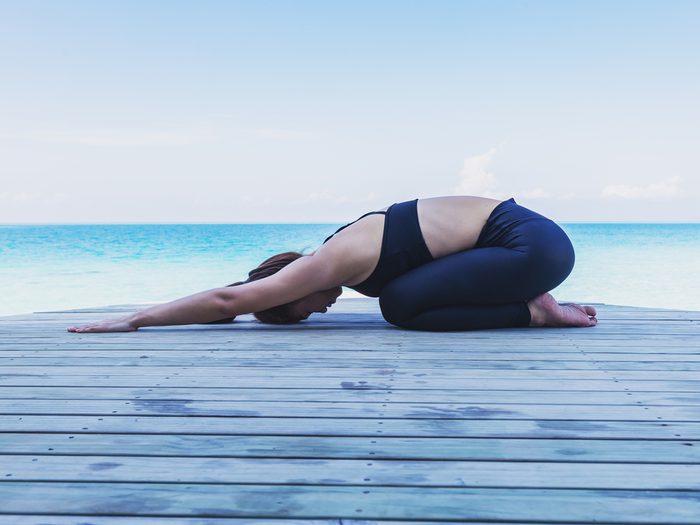
Yoga can help improve balance
The risk of falling increases with age because of a reduced sense of balance as well as muscle and bone strength. According to Health Canada, every year one in three seniors will fall at least once, and about 20 percent of injury-related deaths in seniors are linked to falls. One of the best ways to prevent them is to stay fit, says Dr. McCall. “Yoga improves your balance, making you less likely to fall. And if you have stronger core muscles, you are better able to right yourself if you trip.” It also improves concentration, another way it helps you avoid falls. (Here’s more on how you should be exercising if your 60 and older.)
Pose to try: Child
Pressing the forehead to the floor calms the nervous system and the curled-up position of the body compresses the organs, which promotes relaxation in the body.
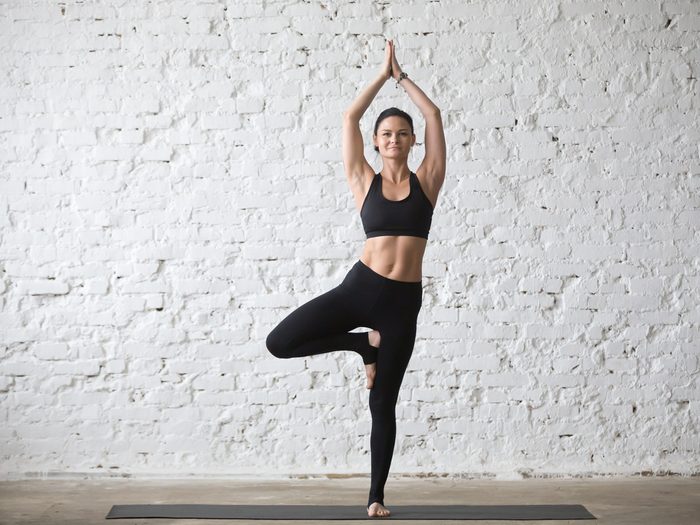
Yoga can help beat stress & depression
A 2012 study in the journal Biological Psychiatry looked at the effect of stress hormones on chromosomes. Researchers found that people who had depression linked to stress had shorter telomeres, the part of the chromosome that protects it from deterioration. Researchers believe shortened telomeres may be linked to age-related illnesses such as heart disease and cancer.
Unchecked stress may also increase your risk of depression in later life. Women are twice as likely as men to develop it, and that risk may grow as we age — approximately 20 percent of seniors living independently experience depression, which could be triggered by stressful life changes. Yoga can help you learn how to manage your stress now and prepare you to cope with life’s challenges later. “How we react to stress is a habit of our nervous system,” explains Dr. McCall. Yoga can break that by teaching you a new pattern of breathing slowly and deeply even when your body is in a physically demanding position. Eventually, your brain learns to remain calm under pressure, says Dr. McCall.
Pose to try: Tree
This pose strengthens muscles and develops balance.
Next, learn which anti-aging foods might be adding years to your life.
